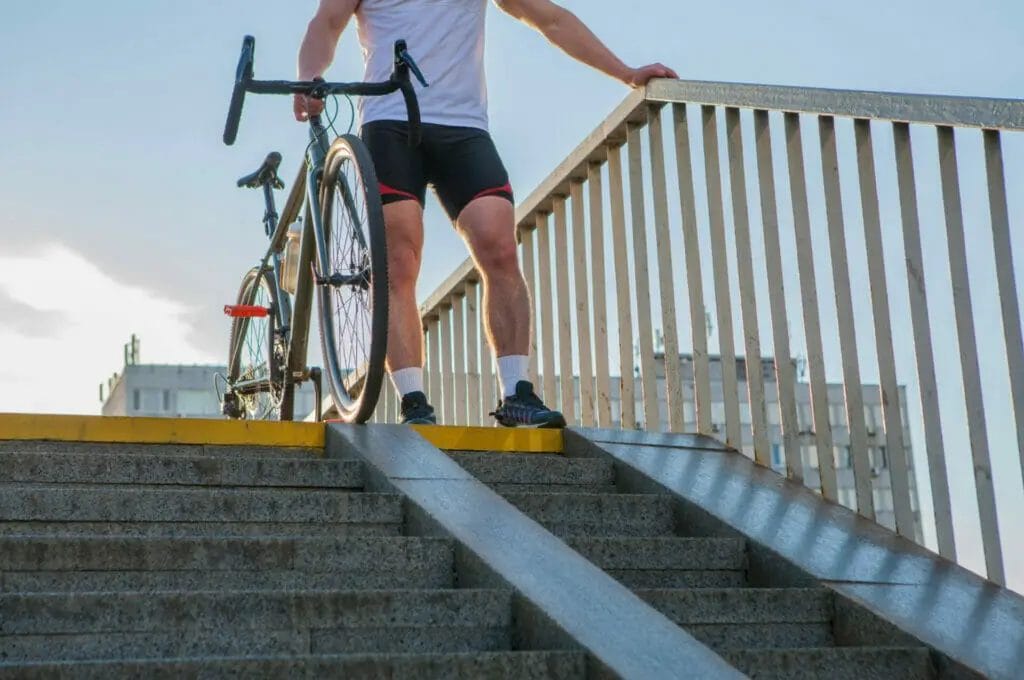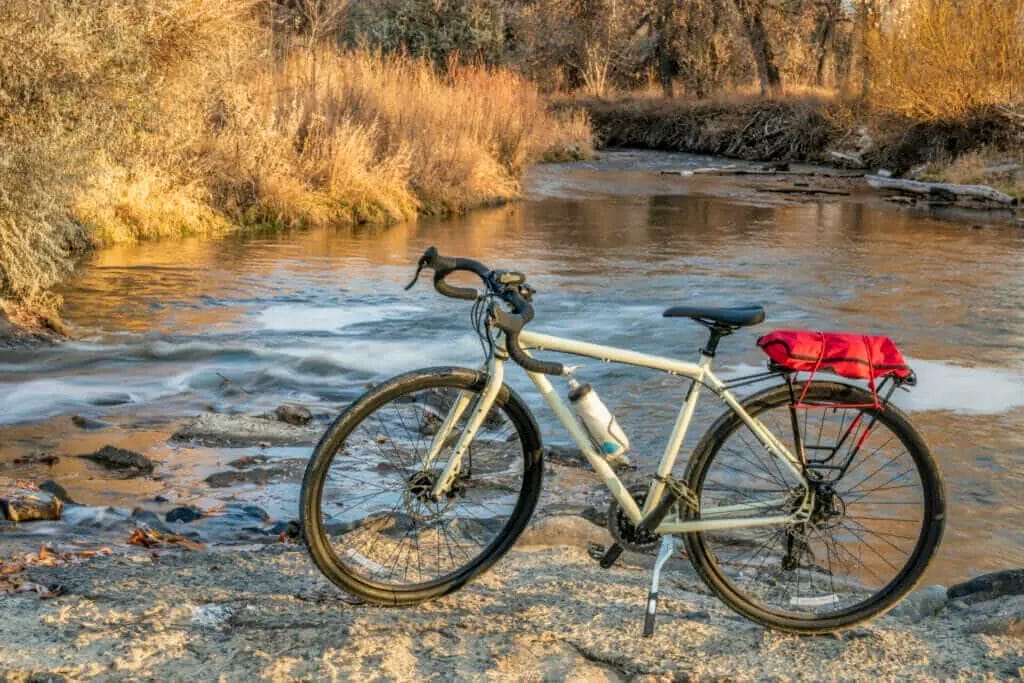Last Updated on February 11, 2024 by Vinson Lozano

As a heavier cyclist, finding the right wheels for your bike is crucial not only for performance but also for safety and durability. The best wheels for you should cater to the additional demands that come with a heavier weight. To maximize your cycling experience and ensure your comfort and efficiency on rides, you need to pay special attention to the construction and specifications of your bike wheels.
Factors to consider when choosing the best wheels for heavier cyclists
When shopping for bike wheels, you need to look at several factors that affect performance and longevity. Firstly, consider the wheel’s rim width and depth; wider rims can offer better stability and accommodate larger, more durable tires. The material of the rim matters too, with options such as aluminum for those on a budget or carbon for a stiffer, often lighter, wheel. Additionally, the build of the wheel is important – look for wheels with a higher spoke count for added strength and support for larger loads. Lastly, opt for well-built hubs with quality bearings that ensure smooth rotation and less stress on the wheel.
Importance of durability and weight capacity
The durability of your wheels is paramount, and this is often directly linked to the wheel’s weight capacity. Wheels designed for heavier riders often feature reinforced spokes, durable nipples, and strong rims to withstand the extra pressure. It is essential to check the manufacturer’s specifications for weight limits to ensure they can safely support your weight. High-quality wheels with adequate weight capacity will not only last longer but also offer peace of mind, allowing you to ride with confidence, knowing your equipment is up for the challenge. Remember, investing in wheels that match your weight and riding style will help prevent premature wear and potential accidents.
Wheel Types to Consider
Understanding different types of wheels for heavier cyclists
When it comes to selecting the best wheels for heavier cyclists, there are several options to consider. Each type of wheel offers its own benefits and drawbacks, so it’s important to understand them before making a decision.
- Traditional Spoked Wheels: These are the most common type of wheels found on bicycles. They consist of a rim connected to a hub with spokes. Traditional spoked wheels are known for their durability and strength, making them suitable for heavier riders. However, they can be slightly heavier and may require more maintenance.
- Tubeless Wheels: Tubeless wheels are gaining popularity among cyclists due to their increased puncture resistance. These wheels use sealant instead of inner tubes to prevent flats. They can provide a smoother ride and better traction. However, tubeless wheels require a specific setup and can be more challenging to install or repair.
- Carbon Fiber Wheels: Carbon fiber wheels are lighter and stiffer than traditional spoked wheels, which can benefit heavier riders by reducing rotational weight. They also offer improved aerodynamics. However, carbon fiber wheels can be more expensive and may not be as durable as other options. They require careful handling to prevent damage.
Advantages and disadvantages of each type
- Traditional spoked wheels offer a balance of durability and strength. They are relatively easy to maintain but can be heavier.
- Tubeless wheels provide increased puncture resistance and a smoother ride. However, they may require more setup and can be more challenging to repair.
- Carbon fiber wheels are lightweight and offer improved aerodynamics. They can enhance performance but may come at a higher cost and require careful handling.
Consider your riding style, weight, and preferences when choosing the best wheels for you. Consulting with a knowledgeable bike shop or experienced cyclists can also provide valuable insight. Remember, investing in the right wheels will not only improve your performance but also ensure your safety and comfort on the road.
Recommended Wheel Brands
When it comes to finding the best wheels for heavier cyclists, there are several top wheel brands known for their strength and weight capacity. These brands offer a variety of features that can enhance your riding experience and provide the durability you need. Here, we will explore some of these brands and the features of their wheels specifically designed for heavier riders.
Top Wheel Brands Known for Their Strength and Weight Capacity
- DT Swiss: DT Swiss is renowned for producing high-quality wheels that are well-suited for heavier cyclists. Their wheels are known for their durability, strength, and precise engineering. DT Swiss offers a range of options, including their renowned 240s and 350 hubs, which provide excellent stability and performance.
- Mavic: Mavic is a trusted brand that offers sturdy wheels designed for heavier riders. Their wheels feature robust construction, reliable hubs, and excellent weight capacity. Mavic’s Ksyrium Elite and Cosmic Pro Carbon SL models are popular choices among cyclists looking for strength and performance.
- Enve: Enve is known for their carbon fiber wheels that offer both lightweight performance and exceptional strength. Their wheels undergo rigorous testing to ensure durability and are designed to handle the demands of heavier riders. The Enve SES 4.5 AR Disc and M Series MTB wheels are well-regarded options in their lineup.
Features of Each Brand’s Wheels for Heavier Cyclists
- DT Swiss wheels are known for their reliability, high load capacity, and precise construction. They provide excellent power transfer and stability, making them ideal for heavier riders.
- Mavic wheels offer a balance between weight, strength, and aerodynamics. They are designed to withstand the demands of different road conditions while providing a smooth ride.
- Enve carbon fiber wheels combine lightweight performance with exceptional durability. They are engineered to absorb vibrations, improve aerodynamics, and offer enhanced control for heavier cyclists.
Remember, when choosing the best wheels for heavier cyclists, it is crucial to consider factors such as your riding style, weight, and preferences. Consulting with a knowledgeable bike shop or experienced cyclists can also provide valuable guidance and help you make an informed decision. Investing in wheels from trusted brands will not only improve your performance but also ensure your safety and enjoyment on the road.
Alloy Wheels
Benefits of Alloy Wheels for Heavier Cyclists
If you’re a heavier cyclist, investing in the right set of wheels can make a significant difference in your riding experience. Alloy wheels, in particular, offer several benefits that can enhance your performance and ensure your safety on the road.
- Durability: One of the key advantages of alloy wheels is their durability. Made from a combination of aluminum and other metals, alloy wheels are highly resistant to corrosion and damage. They can withstand the weight and pressure exerted by heavier riders, providing long-lasting reliability.
- Strength: Alloy wheels are known for their strength. They can handle the additional load without compromising on stability or performance. With their robust construction, alloy wheels offer the strength needed to support heavier cyclists, ensuring a safe and secure ride.
- Lightweight: Despite their strength, alloy wheels are still lightweight compared to other wheel materials such as steel. This reduced weight allows for better acceleration and maneuverability, making your rides smoother and more enjoyable.
Popular Alloy Wheel Options for Weight-Bearing Riders
When it comes to choosing the best alloy wheels for heavier cyclists, there are several options worth considering. Here are some popular alloy wheel brands known for their strength and weight-bearing capabilities:
- Velocity: Velocity alloy wheels are designed with strength in mind. They offer sturdy construction and excellent weight capacity, making them ideal for heavier riders. Velocity A23 and Velocity Deep V are popular choices among weight-bearing cyclists.
- Stan’s NoTubes: Stan’s NoTubes wheels are renowned for their durability and reliability. The Crest and Arch models are particularly well-suited for heavier riders, providing a strong and stable platform for your ride.
- Easton: Easton alloy wheels are known for their quality and performance. With their strong and lightweight design, Easton wheels can handle the demands of heavier riders while enhancing your overall riding experience.
Remember to consider factors such as your riding style, weight, and preferences when choosing the best alloy wheels for your needs. Consulting with knowledgeable bike shop staff or experienced cyclists can provide valuable insights and help you make an informed decision. By investing in high-quality alloy wheels, you can enhance your performance and enjoy a safe and comfortable ride as a heavier cyclist.
Carbon Fiber Wheels
Advantages of Carbon Fiber Wheels for Heavier Cyclists
If you’re a heavier cyclist, finding the right wheels can greatly impact your riding experience. Carbon fiber wheels, in particular, offer several advantages that can enhance your performance and ensure your safety on the road.
- Strength and Durability: Despite being lightweight, carbon fiber wheels are incredibly strong and durable. They are designed to handle the additional weight and pressure exerted by heavier riders, providing a stable and reliable ride. The strength of carbon fiber wheels ensures that they can withstand the demands of weight-bearing cyclists while remaining intact.
- Lightweight Design: Carbon fiber wheels are significantly lighter than traditional alloy or steel wheels. This reduced weight allows for improved acceleration, making it easier for you to maintain speed and conquer challenging terrains. The lightweight nature of carbon fiber wheels also enhances maneuverability, enabling you to navigate sharp turns with ease.
- Enhanced Performance: The stiffness of carbon fiber wheels provides better power transfer from your legs to the bike, resulting in improved performance. The increased rigidity of these wheels allows for efficient energy transfer, enabling you to ride faster and with more control.
Notable Carbon Fiber Wheel Models for Weight Capacity
When choosing carbon fiber wheels for heavier cyclists, there are several models worth considering. These models are known for their weight-bearing capabilities and durability:
- ENVE SES 3.4: ENVE SES 3.4 carbon fiber wheels are designed to handle the demands of heavier riders. They offer excellent weight capacity and are popular among cyclists looking for a combination of strength and performance.
- Zipp 303 Firecrest: Zipp 303 Firecrest wheels are known for their aerodynamics and durability. With their carbon fiber construction, they provide exceptional stability and can support heavier riders effectively.
- Reynolds Assault: Reynolds Assault carbon fiber wheels are engineered with a focus on strength and performance. They offer a high weight capacity and are suitable for riders looking for a reliable and long-lasting option.
Remember to consider factors such as your riding style, weight, and preferences when choosing the best carbon fiber wheels for your needs. Consulting with knowledgeable bike shop staff or experienced cyclists can provide valuable insights and help you make an informed decision. By investing in high-quality carbon fiber wheels, you can enhance your performance and enjoy a safe and comfortable ride as a heavier cyclist.
Spoke Count and Construction
Importance of spoke count for heavier riders
As a heavier cyclist, the spoke count of your wheels becomes crucial in ensuring a safe and reliable riding experience. Higher spoke count wheels provide increased strength and support, making them ideal for riders carrying extra weight. The additional spokes distribute the load more evenly, preventing excessive stress on individual spokes and reducing the risk of failure.
When selecting wheels as a heavier rider, consider opting for wheels with a higher spoke count. Typically, wheels with 32 or 36 spokes are recommended for riders with greater weight. This increased spoke count enhances the wheel’s ability to handle the extra load without compromising on performance.
Different spoke construction types and their impact on weight capacity
Spoke construction plays a significant role in determining the weight capacity of your wheels. There are various spoke construction types, each with its own strengths and limitations.
- J-bend Spokes: J-bend spokes are the most common type and are widely used in wheel construction. They offer good strength and can handle moderate weight capacities, making them suitable for most riders, including heavier cyclists.
- Straight-pull Spokes: Straight-pull spokes have no bend at the hub, reducing weak points and increasing strength. These spokes provide greater resistance to bending and breakage, making them a preferred choice for heavy riders.
- Bladed Spokes: Bladed spokes have a flat, aerodynamic shape that reduces wind resistance. While they offer improved performance, they may have lower weight capacities compared to other spoke types. Therefore, heavier riders may need to consider alternative options for optimal support.
Remember, when choosing wheels as a heavier cyclist, it is essential to consider both the spoke count and construction type. Consult with knowledgeable bike shop staff or experienced cyclists to select the best spoke count and construction that suits your weight, riding style, and preferences. Investing in dependable wheels will ensure a smooth and safe riding experience, regardless of your weight.
Rim Width and Depth
When it comes to selecting the best wheels for heavier cyclists, considering the optimal rim width and depth is crucial. These factors play a significant role in determining the ride quality and durability of your wheels. Let’s delve deeper into what you need to know.
Optimal Rim Width and Depth for Heavier Cyclists
As a heavier cyclist, opting for wider rims can provide several advantages. Wider rims offer better support, allowing for wider tires that can handle higher weights without compromising on performance. They also provide improved stability and better traction, especially when cornering or riding over uneven surfaces.
In terms of rim depth, deeper rims provide enhanced aerodynamics, which can benefit heavier riders on flat roads or during sprinting efforts. However, it’s important to note that deeper rims can be slightly heavier and may not be as stable in strong crosswinds. It’s essential to find the right balance between aerodynamics and stability based on your riding style and preferences.
How Rim Dimensions Affect Ride Quality and Durability
The dimensions of your rims can greatly impact your ride quality and durability. A wider rim allows for a larger tire volume, which can improve comfort by allowing for lower tire pressures. This can be especially beneficial for heavier riders who need extra cushioning. Additionally, wider rims distribute the weight more evenly, reducing the strain on individual spokes and increasing the overall durability of the wheel.
In terms of rim depth, shallower rims tend to be more forgiving on rough roads, as they provide better vertical compliance. Deeper rims, on the other hand, offer improved lateral stiffness, leading to better power transfer and acceleration.
Choosing the right rim width and depth depends on your specific needs and riding style. It’s recommended to consult with knowledgeable bike shop staff or experienced cyclists who can provide guidance based on your weight, preferences, and the type of riding you’ll be doing.
Remember, investing in the right rim width and depth will ensure a comfortable and durable riding experience, regardless of your weight. So, take the time to choose wisely and enjoy the ride!
Tire Selection
Choosing appropriate tires for heavier cyclists
As a heavier cyclist, selecting the right tires is crucial to ensure a safe and enjoyable riding experience. Here are some factors to consider when choosing tires for your bike:
- Weight Capacity: Look for tires that are specifically designed for heavier riders. These tires are usually labeled with a higher weight capacity, indicating that they can handle the added stress and provide better stability.
- Tire Width: Opt for wider tires as they offer better support and can handle higher weights without compromising on performance. Wider tires also provide improved traction and stability, especially when cornering or riding over uneven surfaces.
- Tire Pressure: Inflate your tires to the recommended pressure to ensure optimal performance. Heavier riders may need to slightly increase the tire pressure to prevent pinch flats and improve rolling resistance.
Recommended tire models with high weight capacity
Here are some tire models that are known for their high weight capacity and durability:
- Continental Grand Prix 4-Season: This tire is designed for all-season riding and offers excellent puncture protection and grip. It has a high weight capacity, making it suitable for heavier riders.
- Pirelli Cinturato Velo: Known for its durability and puncture resistance, this tire provides a smooth and comfortable ride. It is also capable of handling higher weights.
- Schwalbe Marathon Plus: Popular among commuters and touring cyclists, this tire has outstanding puncture protection and a high weight capacity. It is known for its longevity and reliability.
Remember to consider your specific needs, riding style, and the conditions you’ll be riding in when selecting tires for your bike. Consult with a knowledgeable bike shop staff or experienced cyclists for further guidance. Investing in the right tires will not only enhance your riding experience but also increase safety and durability. Ride on confidently and enjoy the road ahead!
Conclusion
You now have a better understanding of the importance of branding, how it can help differentiate your business from competitors, and some best examples of successful branding. Remember, branding is not just about a logo or a catchy slogan; it is about creating a strong and reliable brand identity that resonates with your target audience.
Factors to prioritize when selecting wheels for heavier cyclists
When it comes to selecting wheels for heavier cyclists, there are a few factors to prioritize to ensure a safe and comfortable ride. Here are some key considerations:
- Weight capacity: Look for wheels that are specifically designed for heavier riders. These wheels have a higher weight capacity, allowing them to handle the added stress and provide better stability.
- Durability: Opt for wheels made from strong and sturdy materials, such as aluminum or carbon fiber. These materials are known for their durability and can withstand the extra weight.
- Spoke count: Choose wheels with a higher spoke count, as they provide better support and strength. More spokes distribute the weight evenly, reducing the risk of the wheels becoming damaged or buckling under the load.
- Rim width: Consider wider rims, as they offer better support and allow for fitting wider tires. This can improve stability and control, especially for heavier riders.
Tips for maintaining and prolonging the lifespan of wheels for weight-bearing riders
To ensure the longevity of your wheels and maintain optimal performance, here are some tips for maintenance:
- Regular inspection: Check your wheels for any signs of damage or wear regularly. Look for cracks, loose spokes, or any other issues that may affect their performance.
- Proper tire pressure: Inflate your tires to the recommended pressure to prevent pinch flats and improve rolling resistance. Heavier riders may need to slightly increase the tire pressure for better support.
- Keep them clean: Regularly clean your wheels to remove any dirt or debris that may cause damage. Use a mild detergent and a soft brush or cloth to gently clean the rims and spokes.
- Proper storage: When not in use, store your bike in a dry and cool place to prevent any moisture or extreme temperatures from affecting the wheels’ integrity.
By prioritizing the right factors when selecting wheels and following these maintenance tips, you can prolong the lifespan of your wheels and ensure a smooth and enjoyable ride as a heavier cyclist. Remember, investing in high-quality wheels is a worthwhile investment that will enhance your riding experience and increase your safety on the road.


